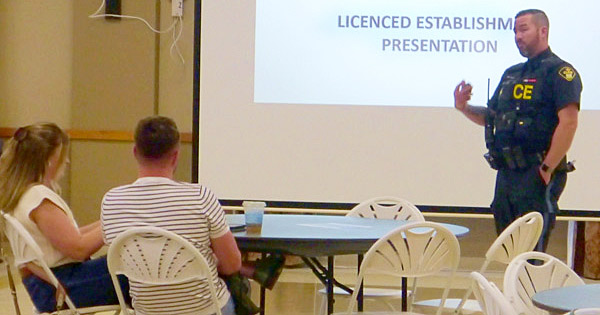Liability of drinking is focus of education event geared to hospitality industry
Administrator | May 18, 2025 | Comments 0

Story and photo by Sharon Harrison
“Impaired driving is the biggest epidemic in our society,” proclaimed OPP constable Ben Huddleston, adding that impaired driving is also a community problem.
Implications of impaired driving, especially as they relate to the liability and legal implications for the hospitality industry, were shared an educational event this week at the Wellington and District Community Centre.
A team-based initiative to reduce impaired driving, the event was hosted by the Ontario Provincial Police (OPP) and Alcohol and Gaming Commission of Ontario (AGCO). The AGCO is responsible for regulating the sale, service and delivery of liquor in Ontario.
The free event, geared to restaurant, winery and hospitality industries in the County (although anyone was welcome) saw around 30 people in attendance.
Facilitating the session was Huddleston, with the traffic incident management enforcement team working out of Quinte West.
He spoke to the human cost of impaired driving, education, awareness, engagement, community safety, the exhaustive list of impaired driving signs, transporting alcohol, and as well provided some statistics.
He was joined by AGCO inspector Jade Leadbetter, who explained what her role as inspector entails, the consequences of serving a drunk person or a minor, how to spot signs of intoxication, how to prevent intoxication, and the responsibility of establishment owners and servers.
Every OPP detachment is required to have a strategic action plan (essentially a business plan) which has three areas of focus:
1. Crime reduction (property crime, violent crime, drug crime);
2. Highway safety (more police officers are killed every year in vehicle collisions than violent crimes). “As a police officer, I am more likely to lose my life at the side of the road and get killed by a car than I am in a gun fight”); and
3. Other priorities (domestic violence, impaired driving, mental health incidents, fraud).
Huddleston said safety is number one when it comes to policing.
“Everything that we do, everything that our officers do, we have public safety in mind,” he said. “And while sometimes the public isn’t always very happy interacting with us, and they go home and get a $615 ticket for being on their cell phone while they are driving, they may not initially be very happy with us, but ultimately the reason why we are out there doing that is for community safety.”
Sharing some statistics on impaired driving, he said in the period 2020-2024, Prince Edward County averaged 40 impaired driving arrests per year for each of those years. He also highlighted an increase in such arrests, where in 2021 there were 52 impaired driving arrests in the County, which jumped to 69 in 2022, peaking in 2023 at 87. The number dropped in 2024 with 52 arrests.
As of May 14, there have been 21 arrests for impaired driving so far in 2025 in the County. Huddleston suggested they were on track for 80, maybe 86 this year.
Looking at how impaired drivers were caught, in 2024, 31 per cent were during RIDE programs, 29 per cent were called in by the public, 23 per cent were as a result of proactive traffic stops, and 17 per cent were collision related.
When asked why there were so many impaired driving arrests in Prince Edward County, Huddleston said he didn’t know, but added that the County isn’t the only community with a lot of impaired drivers.
While he said some people often think impaired drivers are most often from anywhere but the County, the statistics prove otherwise, with 67 per cent having a Prince Edward County or Quinte area address, versus 33 per cent in the non-local address category.
Eighty-five per cent of those arrested for impaired driving in 2024 were male, 15 per cent were female. The average age was 37 for males, 43 for females.
Providing a reminder on how alcohol should be transported in private vehicles, Huddleston said alcohol should be unopened, sealed and the safest place is to store it is in the trunk of a vehicle (although the centre console is permitted with unopened alcohol). If the seal is broken, he recommends fastening the product closed and storing it in the trunk.
He answered a question he had recently received, asking: “As a designated driver with a large vehicle (a bus or a limousine, for example), can passengers in the back be drinking while the designated driver is driving?”.
“No,” confirmed Huddleston, “You can’t be drinking in the back of a vehicle while someone else is driving”.
Huddleston shared some information on how impaired driving evidence is sensory in nature.
“You see impaired driving; you can hear impaired driving (abusive language, slurred speech, difficulty formulating and providing answers), you can smell impaired driving (alcohol, unusual odours).”
Jade Leadbetter, AGCO inspector, responsible for the areas of Prince Edward County, Belleville, Trenton and Kingston, concluded the afternoon with a condensed presentation which covered information and tips for establishments serving alcohol.
She can be found at venues in the County over the summer where her role is to enforce the liquor licensing control act, ensuring staff and patrons are safe, where she said AGCO inspectors can enter any place at any time to carry out their work that is reasonable, but not if a business is closed, for example.
“If you are open and you have customers, then you have to let me in to do my work, where I can enquire as to financial transactions, SmartServe, lease agreements, and so on, and I can do tests (not taste tests) to ensure alcohol isn’t being watered down or changed, and we can remove things for testing,”
Leadbetter spoke to one the AGCOs programs where they also work closely with the OPP called “the last drink program” that runs across Ontario.
She explained that anytime a police officer stops a car for suspected impaired driving and it turns out that person is impaired, they ask the question to the driver, “where did you have your last drink?”. That then leads the AGCO to do an investigation to see what happened.
She said, sometimes people lie, saying there were at a different bar, maybe their friends own the bar and they don’t want to get them into trouble, some say they don’t remember.
“When we do our investigation, we are going to check for receipts, we are going to check cameras, we are going to check and see where was that person drinking; did you serve them too much, did you miss those signs, should you have called 911 when they were getting to their car, what were the circumstances.”
She said it’s important because there are consequences to serving a drunk person or serving a minor, and this is for anybody that works in an establishment that serves drinks, where the fines for serving alcohol to an intoxicated person are significant: $250,000 for corporations (the holder of the licence). $100,000 for servers who serve alcohol to a person who is intoxicated. Or, you can go to jail for up to a year.
“We do see those penalties, and that’s why it’s important that you don’t serve people to that state. Serving intoxicated people, serving minors, should not happen. Does it? Absolutely, but we try very hard with the AGCO of having me come in, having these information sessions to ensure that you all know everything we are looking for when you are bar serving alcohol to make sure that those things don’t happen. And again, you can go to jail.”
Serving a minor doubles the fine – $500,000 fine to the liquor licence holder, $200,000 to the server.
Leadbetter spoke to the big five, the main things that will get people into trouble with the AGCO the fastest, and things they look for are serving minors, permitting drunkenness or selling to a drunk person, permitting disorderly behaviour, overcrowding, and before and after hours service.
In Ontario, you have to be 19 years of age to have alcohol in your possession (to hold it or to consume it). You only have to be 18 years of age to serve alcohol. And minors (of any age) are allowed in an establishment serving alcohol, but they cannot be drinking – that is illegal.
Leadbetter spoke to “pass offs” , where someone will buy two drinks where one of those drinks is intended for another person under the age of 19, and the server has no idea if that person may be a minor or intoxicated. It is illegal to do so and the establishment is responsible.
She also spoke to identification and the types of ID and how to check ID, especially if it unfamiliar and from a different jurisdiction, for example. An establishment has to ask to see the ID of anyone who appears to be under the age of 19. If ID is not forthcoming, or ID doesn’t appear genuine, and they appear to be young, Leadbetter said establishments should refuse service.
Recognizing the signs of intoxication and impairment were also shared by Leadbetter.
“In Ontario, you cannot be intoxicated, drunk or impaired in a licensed establishment,” she said. “If you have a bar or restaurant, you can’t be drunk inside, you know that, but people that come out to your establishment don’t know it, and they don’t care. So your job is to make sure that they do not become intoxicated, or that you do not let them in if they are already intoxicated from somewhere else.”
It takes three or more signs for an AGCO inspection to view someone that has impaired signs to cite an infraction against the establishment for permitting that person to be intoxicated.
“If they are already intoxicated, you can’t obviously serve them more liquor, but that does happen.“
She acknowledged that it is difficult, and bar staff have an incredibly hard job, especially in a place like the County where people are going to multiple establishments, such as on a wine tour.
“You always want to be the first winery and not the last because you are never going to know where you are in that tour,” explained Leadbetter. “Each time someone comes to you to get a drink, all you have to do is assess them. Should they have a drink here?”
“I don’t care if they have gotten off their limo, if they have ridden their bike here, or paid a million dollars to get here, it doesn’t matter – can they have a drink from me right now is the only question you have to answer.”
Signs of intoxication or impairment may include s change in speech, such as speaking more loudly than necessary, slurring words, not being understandable, using foul language, talking too slow or too fast, memory loss (forgetting where they are, or forgetting they had ordered a drink), repeating stories or jokes, having slow responses to questions, losing their train of thought, unable to do simply calculations, becoming argumentative, being aggressive, making sexual advances, or being overly friendly – all signs of intoxication.
Leadbetter said a single sign isn’t necessarily linked to someone being intoxicated, but could be a piece of a bigger puzzle.
“If you can’t serve them a drink because they are impaired, that is certainly not discrimination, and we expect you to do it,” she added.
Any establishment serving alcohol has the responsibility to monitor their customers, where she outlined what to do if someone in the bar is drunk.
“Know that in Ontario, you are responsible for that drunk person until they are no longer intoxicated. It doesn’t mean giving them coffee, giving them water, something to eat, that is not going to sober them up. It’s time, and usually time is the next day, and you are actually responsible for them until they are no longer intoxicated.“
The key is to not get them that way in the first place, she said, but if they are that way, the establishment must ensure they are safe.
“If they leave your four corners, they are still yours, so always remember that.”
She also touched on how to prevent drunkenness and disorderly behaviour, including calling other establishments to warn them should you know they may be leaving one establishment for another in a drunken state.
Also, basics like having enough staff, and having a plan in place, and ensuring staff don’t drink on the job – it is not illegal for staff to drink on the job, but assessing impairment levels of patrons cannot be done properly if the staff are also intoxicated. Anything out of the ordinary, document it, recommends Leadbetter.
“When we are coming in to do an inspection, we aren’t coming in to see if you are doing something wrong or catch you doing something wrong, we are making sure people are safe, and we are making sure you are safe as well.”
Huddleston said there isn’t a single community in Ontario or Canada that has zero impaired driving occurrences.
“If you haven’t had somebody in your life that was killed or seriously injured by impaired driving, that’s a wonderful thing, but for a lot of other people, that is unfortunately not the reality, and it’s a terrible, terrible experience, and terrible to encounter. It impacts society and everybody else, not only emotionally, but financially; for us, it’s indescribable.”
“Impaired driving is an emergency” where Huddleston said the recommendation is to call 911 immediately as dispatch can route a call quicker than calling the PEC detachment directly. He said the public shouldn’t hesitate to call if they have reasonable suspicion of impaired driving, and he said the OPP don’t mind if it turns out not to be an impaired driving situation as they would rather check to be safe.
For the public reporting a potential impaired driving situation, at a minimum, get the licence plate. If possible, get the make, model and colour of the vehicle, and the direction of travel, road name where last seen, etc.
“With impaired driving, one is too many,” added Huddleston.
Filed Under: Featured Articles • Local News
About the Author:




























